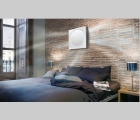Air conditioning embraces IAQ

Air conditioning delivers a quality indoor environment, and that quality can extend to indoor air quality — as Jody Lees of LG explains.
Air conditioning was a term associated predominantly in the UK with up-market cars and foreign holidays until maybe 10 years ago. More commonplace in the commercial world – in offices, hotels, and workplaces before then, it has become an essential ingredient in most commercial and public buildings over the past decade and although not so prevalent, is seeing a much increased ‘airing’ in domestic properties as well.
And the benefits of air conditioning would seem pretty obvious – it cools the air in the building we’re in. But actually, air conditioning does so much more than cooling a building and offers a far wider range of benefits than are immediately obvious — especially relating to indoor air quality. Let’s take a closer look.
Let’s concentrate on the cooling capabilities of air-conditioning systems first.
Today’s air conditioning systems certainly do enable us to moderate the air temperature within a building, which can make us far more comfortable and, also, in a working environment can make us more productive and able to focus than if we’re stifling in the heat, perspiring because the outside weather has got inside the building where we work.
In a retail environment, air conditioning tends to see shoppers spending longer in shops and shopping centres to take advantage of that level of comfort.
And you wouldn’t consider going to a cinema in the summer if there wasn’t air conditioning to make the experience a pleasant one, however good the film was meant to be.
In a domestic situation it can enable us to sleep on those sticky, warm nights when we can’t cool down and the fan we’ve liberated from the attic won’t provide the targeted cool air we want — and it’s so noisy anyway that we can’t get to sleep even if we cool down! Air conditioning can cope with the problem quickly and effectively.
Another major benefit of air conditioning surrounds the word we just used — sticky. Air conditioning, as well as cooling the air, takes moisture out of the air for us reducing the humidity levels associated with warm spells in the UK — thereby improving indoor air quality. Another benefit of modern air-conditioning systems is their low noise levels; virtually silent operation helps us in workplaces and at home when we’re trying to sleep.
In addition, air conditioning at home means we can keep windows closed — keeping out noise pollution, insects and those allergens that can cause so much grief for those who suffer from asthma and hay fever.
There are similar benefits for working environments. A quality air-conditioning system will save employees wanting to open windows to get cooler air into a building — keeping traffic fumes outside in city-centre offices and public buildings. The benefits are clean air and low noise levels — leading to fewer distractions and reduced production time losses.
As well as cooling, air conditioning can improve air quality. Most modern air-conditioning systems include filters to remove all or most of the bacteria, dust and pollen in the air. In homes the filter can also remove animal hair and house mites.
There are even systems trialling the addition of certain aromas to the system, to mask smells in the workplace or simply to make shopping or exercising in a particular gym venue more attractive. The problem with this is that a smell one person finds attractive, another finds impossible to cope with.
And the great benefit of many modern air conditioning systems is that they also provide heat when you need it — and quickly. Today’s air-conditioning systems mainly use extremely energy-efficient heat-pump technology that uses around 80% less electricity than any other form of electric heating.
Air conditioning makes huge sense from whichever angle you approach it — commercial or domestic systems. They offer a win-win-win solution to so many issues. Take a closer look at the options, it makes sense to be cool.
Jody Lees is head of air conditioning and energy solutions for LG in the UK.







